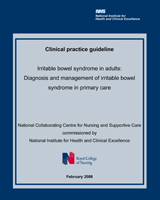| Global improvement of IBS symptoms (no of patients) | 2 trials; 41 patients; from MA; (parallel design); | OR=3.85 (95%CI 2.03, 7.29) | p=0.18; I2=45% | Statistically significant, favours hypnotherapy; OR calculated for 1 study | Good | Indirect setting-minor, secondary care OPD | Sparse data | consistent | --- | Overall improvement of symptoms and general well being. 1/2 severe refractory IBS.
Secondary care. | Moderate |
| Global improvement of IBS symptoms (mean score) | 1 trial; 30 patients; from RCT; (parallel design); | MD=2.43 (95%CI 0, 0) | | Statistically significant, favours hypnotherapy; SDs not given, but p<0.0001. Scale 0–3. | Good | Indirect setting-minor, secondary care OPD | Sparse data | consistent | --- | Overall improvement of symptoms and general well being.
Severe refractory IBS. Secondary care. Two therapies delivered by same therapist - possible therapist effect. | Moderate/Low |
| Global IBS symptom score | 1 trial; 81 patients; from RCT; (parallel design); | MD=−8.5 (95%CI −14.54, − 2.46) | | Statistically significant, favours hypnotherapy. Baseline scores ~40; scale probably 22 to 154 | Good | Direct | Precise | consistent | --- | Change from baseline at 12 weeks (follow up 7 weeks after end of treatment); primary care; refractory IBS | High |
| Global IBS symptom score | 1 trial; 81 patients; from RCT; (parallel design); | MD=−2.7 (95%CI −10.48, 5.08) | | Not significant. Baseline scores ~40; scale probably 22 to 154 | Poor drop outs | Direct | Precise | consistent | --- | Change from baseline at 52 weeks; primary care; refractory IBS; 35% missing data (said to be missing-at-random) | Moderate |
| pain score | 1 trial; 81 patients; from RCT; (parallel design); | MD=−14.4 (95%CI −24.69, − 4.11) | | Statistically significant, favours hypnotherapy. Baseline scores ~54 | Good | Direct | Precise | consistent | -- | Change from baseline at 12 weeks (follow up 7 weeks after end of treatment); primary care; refractory IBS | High |
| pain score | 1 trial; 81 patients; from RCT; (parallel design); | MD=−0.6 (95%CI −13.27, 12.07) | | Not significant. Baseline scores ~54 | Poor drop outs | Direct | Precise | consistent | --- | Change from baseline at 52 weeks; primary care; refractory IBS; 35% missing data (said to be missing-at- random) | Moderate |
| pain score | 1 trial; 30 patients; from RCT; (parallel design); | MD=−9.4 (95%CI 0, 0) | | Statistically significant, favours hypnotherapy; SDs not given, but p<0.0001. Scale 0–21. | Good | Indirect setting-minor, secondary care OPD | Sparse data | consistent | --- | Severe refractory IBS. Secondary care. Two therapies delivered by same therapist - possible therapist effect. | Moderate/Low |
| Bloating score | 1 trial; 30 patients; from RCT; (parallel design); | MD=−10 (95%CI 0, 0) | | Statistically significant, favours hypnotherapy; SDs not given, but p<0.0001. Scale 0–21. | Good | Indirect setting-minor, secondary care OPD | Sparse data | consistent | --- | Severe refractory IBS. Secondary care. Two therapies delivered by same therapist - possible therapist effect. | Moderate/Low |
| Diarrhoea | 1 trial; 81 patients; from RCT; (parallel design); | MD=−7.9 (95%CI −16.29, 0.49) | | Not statistically significant, favours hypnotherapy. Baseline scores ~33 | Good | Direct | Precise | consistent | --- | Change from baseline at 12 weeks (follow up 7 weeks after end of treatment); primary care; refractory IBS | High |
| Constipation | 1 trial; 81 patients; from RCT; (parallel design); | MD=−2.4 (95%CI −11.61, 6.81) | | Not statistically significant, favours hypnotherapy. Baseline scores ~38 | Good | Direct | Precise | consistent | --- | Change from baseline at 12 weeks (follow up 7 weeks after end of treatment); primary care; refractory IBS | High |
| Quality of life | 1 trial; 81 patients; from RCT; (parallel design); | MD=8.7 (95%CI −2.82, 20.22) | | Not significant, favours hypnotherapy. Baseline score ~50 | Good | Direct | Fairly wide CI | consistent | --- | Overall QoL scores at 12 weeks (follow up 7 weeks after end of treatment); primary care; refractory IBS | Moderate |
| Quality of life | 1 trial; 81 patients; from RCT; (parallel design); | MD=9.5 (95%CI −3.67, 22.67) | | Not significant, favours hypnotherapy. Baseline score ~50 | Good | Direct | Fairly wide CI | consistent | --- | Overall QoL scores at 6 months; primary care; refractory IBS | Moderate |
| Quality of life | 1 trial; 81 patients; from RCT; (parallel design); | MD=9.6 (95%CI −3.75, 22.95) | | Not significant, favours hypnotherapy. Baseline score ~50 | Poor drop outs | Direct | Fairly wide CI | consistent | --- | Overall QoL scores at 12 months; primary care; refractory IBS; 35% missing data (said to be missing-at-random) | Moderate/Low |
| other medication use | 1 trial; 81 patients; from RCT; (parallel design); | RR=0.61 (95%CI 0.4, 0.94) | | Statistically significant, favours hypnotherapy. Control group rate 79% | Poor drop outs | Direct | Fairly wide CI | consistent | --- | Prescription medication over 12 months; primary care; refractory IBS; 35% missing data (said to be missing-at-random) | Moderate/Low |
